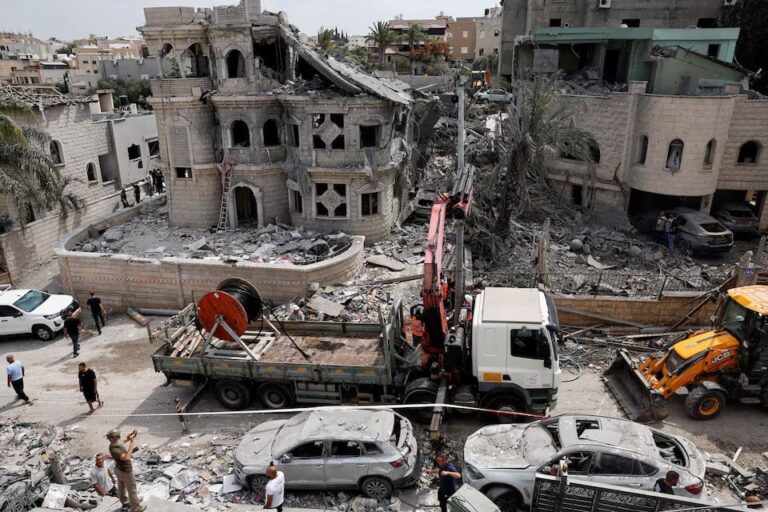Israel and Iran launched fresh attacks on each other overnight into Sunday, killing scores and raising fears of a wider conflict, as US President Donald Trump said it could be ended easily while warning Tehran not to strike any US targets.
Israeli rescue teams combed through rubble of residential buildings destroyed by Iranian missiles, using sniffer dogs and heavy excavators to look for survivors after at least 10 people, including children, were killed, raising the two-day toll to 13.
Sirens rang out across Israel after 4 pm on Sunday in the first such daylight alert, and fresh explosions could be heard in Tel Aviv.
In Iran, images from the capital showed the night sky lit up by a huge blaze at a fuel depot after Israel began strikes against Iran’s oil and gas sector – raising the stakes for the global economy and the functioning of the Iranian state.
Iran has not given a full death toll but said 78 people were killed on Friday and scores more have died since, including in a single attack that killed 60 on Saturday, half of them children, in a 14-storey apartment block flattened in Tehran.
Israel launched “Operation Rising Lion” with a surprise attack on Friday morning that wiped out the top echelon of Iran’s military command and damaged its nuclear sites, and says the campaign will continue to escalate in coming days. Iran has vowed to “open the gates of hell” in retaliation.
The Israeli military warned Iranians living near weapons facilities to evacuate.
“Iran will pay a heavy price for the murder of civilians, women and children,” Israeli Prime Minister Benjamin Netanyahu said from a balcony overlooking blown-out apartments in the town of Bat Yam where six people were killed.
An official said Israel still had a long list of targets in Iran and declined to say how long the offensive would continue. Those attacked on Saturday evening included two “dual-use” fuel sites that supported military and nuclear operations, he said.
President Masoud Pezeshkian said Iran’s responses will grow “more decisive and severe” if Israel’s hostile actions continue.
Earlier, Israel attacked the Shahran oil depot in Tehran early Sunday, but Iranian authorities have assured that the situation is fully under control.
According to the state-run SHANA news agency, operated by Iran’s oil ministry, the impacted fuel tank did not contain a significant volume of fuel at the time of the attack.
‘The fuel volume in the targeted tank was not high, and the situation is fully under control,’ SHANA reported.
On the other hand, Yemen’s Houthi movement announced on Sunday that it launched ballistic missiles towards central Israel in coordination with Iran, marking the first time the Iran-backed group has publicly declared joint military action with Tehran, Reuters reported.
In a televised statement, Houthi military spokesperson Yehya Sarea said the group fired several missiles at the Israeli city of Jaffa within the past 24 hours.
He stated the assault was “in triumph for the oppressed Palestinian and Iranian peoples” and confirmed that the strike was carried out in coordination with recent Iranian military operations targeting Israel.
The announcement comes amid escalating regional tensions, as the Houthis, who control much of northern Yemen, have intensified attacks on Israel and shipping routes in the Red Sea since November 2023.
These moves are part of what the group claims is its support for Palestinians during Israel’s ongoing conflict with Hamas in Gaza.
This development highlights deepening military cooperation between Iran and its regional allies, potentially expanding the Israel-Gaza conflict’s impact across the Middle East.
The Israeli military said that missile sirens were activated in several parts of the country following launches from Iran and Yemen, as missile exchanges between Israel and Iran continue to escalate after Israel’s largest-ever military strike on Iranian targets on Friday.
On the same day as the Israeli strike, a missile launched from Yemen landed in Hebron, located in the Israeli-occupied West Bank, according to Israeli authorities.
However, Yemen’s Houthi group has not claimed responsibility for that particular attack.
The Iran-aligned Houthis, who control much of northern Yemen, have repeatedly launched missiles and drones towards Israel since November 2023, claiming to act in solidarity with Palestinians amid the ongoing war in Gaza following Hamas’s 7 October attack on Israel. Most of the Houthi projectiles have reportedly been intercepted.
The US also launched intensified strikes against the Houthis this year, before President Donald Trump halted the offensive after the Houthis agreed to stop attacks on American ships.

